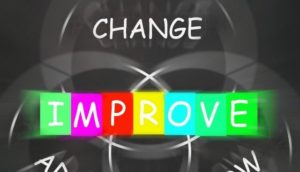This is part 3 of a 4 part series
Ken Sher is a Executive Coach and Career Consultant.
Contact him at shercoaching.com.
In my first blog about losing a job or needing to transition to a new job when you’re in the second half of your career, we saw the big picture impact of this major life event. In part 2, we saw the psychological effect losing a job can have and ways to begin to overcome the pressures that come with it. In this, part 3, we focus on preparing yourself for the next phase of your life from a personal, professional and family perspective. Now it’s time to put it all together to build your improved, well rounded and balanced life. Part 4 will complete the series by describing how to “make it happen” to enhance your current job status or to make a career transition.
Rebuild Some Structure into Your Life
One of the big challenges in being out of work is a loss of structure. The feeling can be similar when you’re “stuck” in a job/career that you find unfulfilling…. There’s little or no real purpose or direction in what you’re doing. At this point in your life, you’ve probably established a pretty strong routine for yourself that totally revolved around your job. Maybe you got up early for exercise or to meditate…maybe you didn’t…we’ll discuss later why this is probably a good time to think about starting. Then, it was off to the office for a full 8, 10 or even 12 hour day filled with planned meetings, appointments with vendors, discussions with your peers, supervisor and/or your direct reports. Maybe you were even lucky enough to have an administrative assistant to help organize your day and to get done for you some of the administrative parts of your job that you didn’t like to do. Then, you’d head home, maybe even bring some work with you, and after a fast meal (often without the family), and a little television it’s time for bed to get some rest before doing it all again the next day.
But, suddenly, this structure is gone. Now, you’re home and with your spouse a lot more than either of you are used to. Or maybe your spouse is out to work and you’re home alone or with the kids. This is a new experience for all of you or, at least, one you haven’t had to deal with in a while and it can be very unsettling and scary… but it can be awesome too. Whatever it becomes, it’s all up to you now. You can take control of your life again and that is a fantastic and frightening experience. So, where do you start?
Where to Start
Well, depending on your personal circumstance, you may want to take a little breather to clear your head and enjoy your life as you couldn’t while you were working. As was written in the second part of this series, you need to be kind to yourself. Regardless of what led you into this situation, you need to forgive yourself and let go of the negative feelings associated with your job loss. Neither of those things will help you get to where you want to be in this next, great, phase of your life.
This can be a great time to reconnect, on a different level, with your family. Now is the time for you to really be present, for them, and to focus on what’s important to them and how you can be there in a way you haven’t been able to be for a while. Maybe you’ll take a trip with your spouse and family or just be there for them as a support or cheerleader for what they’re doing in their lives. Whatever you do, know that you’re all in this together. Your family should see you as a mortal person who is aware of the situation and willing to discuss your fears and concerns, but one who is also a confident person with a plan to get back on track and rebuild your life in a way that is even better than it was before.
You also want to take some personal time too. It may only come in small parts of each day or week, but it’s important for you to reconnect with yourself as well. This could be a time for you to look at your life style and to improve your diet and/or the amount of physical activity you participate in. Maybe you’ll work on a long neglected home project or maybe you’ll totally relax and work on your golf game. All healthy things to do, but there will be a time when you will need to get back in the game and having an organized, balanced plan will be important to your success.
What do I mean by balanced? I mean you may consider rebuilding your life in a different way than you had before the job loss. Consider how you’re going to develop your professional life in a healthy way that allows you to spend valuable time away from work without worrying about the stresses of the job. And it means living so that your personal life defines you more than your professional life.
Chart Your Course
So let’s begin at the beginning. In considering your work life, you know that structure and good planning & organization are keys to success. So it makes sense to have some sort of system that you can use to organize your time and to keep track of your appointments and contacts. Certainly Microsoft ™ Outlook is an easy program to use and it is easily linked with your phone which is necessary in today’s world. The first thing that should be on your calendar, every morning, is “me” time. No matter what else happens in your life, you need to take care of yourself first… not your job, not your boss and not your company. This “me” time can come in the form of exercise or meditation or both. When you get yourself in a good place, both physically and psychologically, you will be in a much better place to clearly define and see the path you want to take at this time of your life.
Once you feel ready to go in both the mind and body, if you don’t already know for sure, you’ll need to figure out what professional direction you want to go both personally and professionally. What are the financial realities of your life? What’s really important to you? What values or ideals are you not willing to sacrifice or compromise on? If you had your choice to do anything, what would you do? What will get you out of bed excited and energized every day? So day 1, and everyday moving forward, should start with some reflective time for you to gather your thoughts and to begin to develop goals for yourself. In this case, the best place to start is at the end. Where do you want to land? It’s been said, “If you don’t know where you want to go then how will you know when you get there?” So, do as Steven Covey professes, “begin with the end in mind”.
Identify Your Needs
Now this may take some time. The first question might be “what is it that I need?” Do you need to find a job that brings in the same income, or more, than your previous role? Have your life circumstances changed so you don’t need to earn as much as you were earning (i.e. no more Confirmations, Bar Mitzvahs, college tuitions or weddings) Do you want to find a job in the same area you just left? Do you want to start a whole new career? Do you want to start your own business?
Don’t underestimate the importance of this step. Your ultimate decision may be as simple as getting back on the same career track you were previously on. Nothing wrong with that. But, you don’t want to miss the opportunity of a lifetime… a second chance of sorts. Take some time to think of the possibilities. What is it that truly energizes you and makes you happy and feeling fulfilled. Is it giving back to the community? Do you like to teach young people? Do you like to coach business people to excel in their careers? Are you an artist… a photographer, a musician or a painter? Think about it…You are an experienced, successful person and you can take all that you’ve learned over the years and blend it with what you want to do most. Imagine that… following your passion and making money doing so.
In the end, you may have two tracks that you want to take. First, you may want to get back into the career you were in for any number of reasons… you like it, it pays well, you need the medical benefits. Once again, there is nothing wrong with that. But, you may, at the same time… and this is a great time in your life to do this…begin preparing yourself for that rediscovered passion you have deep inside you. Maybe you’ll start taking courses to get you there. Maybe you’ll begin volunteer work to get some valuable experience in another role. Or maybe you’ll start to build your next career in your spare time. The bottom line is that, regardless of the direction you go, taking time to contemplate your future will help you develop a new beginning for not only your professional life, but for your personal and family life too as you rediscover the things that are truly important to you. Plus, it will create a sort of safety net that will help prevent you from finding yourself in the same situation again.
Learn Who and What You Need to Know
Once you feel comfortable that you know the direction you want to go in (or you’re pretty sure at least), it’s time to plan how you’re going to get there. The first part of any good job search is research. If you don’t already know the industry well, then hit the computer and learn everything you can about it and the key players impacting that market.
Perhaps unlike the last time you were in the job market, LinkedIn is going to play a key role in how you land your next job. It will help you market yourself, build a network and it is a place where most recruiters look today to fill roles in their organization. If you are not comfortable with LinkedIn, then it is a must that you take the time to learn about how to use it to your advantage. You can research best practices on-line, talk to friends or reach out to a career coach or expert on the topic. I can’t stress enough the importance of this great networking and job hunting tool.
Then, start searching your LinkedIn connections and other networking groups to identify the people, in the industries you’re interested in, that you are directly related to and any 2nd or 3rd contacts that you’ve found within your direct contacts. Now that you have a list, begin reaching out to people to start getting out to meet key targets and to expand your networking reach. There are many different strategies you can take to do this effectively. You just need to find an approach that works for you. Often, working with a friend, mentor or coach can help you expand your thought process and your ability to begin marketing yourself effectively. At this point, it’s not about interviewing or asking for a job. It’s about getting yourself out there, meeting new people and opening doors for future job opportunities. Set daily goals for yourself regarding the number of calls you’ll make, the number of new contacts you’ll reach out to and the number of interviews you’ll secure. Having “metrics” will help you to feel more productive even on those days when you feel like you didn’t get anywhere at all.
One of the keys to a successful career or job transition is patience. You can’t shortcut the process. If you do, you might find yourself on an interview for the exact job you’re looking for, but not prepared to win it. Why? Because you didn’t put the time and/or effort into doing thorough research on the position. There aren’t a lot of absolutes in this world, but one is that the more prepared you are for the interview… in other words the more you know about the job, the company, the industry, the marketplace and the people,,,the more comfortable and confident you’ll be in the interview and the more likely you are to be successful in your pursuit of that job.
Part 4 of this 4 part series is entitled: “Survive and thrive after a job loss when you’re 50+/- years old:Making it happen” will be published shortly. Please feel free to share this with anyone you think might benefit from knowing that as bad as a job loss or feeling stuck in a career is, there is still realistic hope for an improved situation and a better life.
Ken Sher is a Career and Life Coach who focuses on the whole person when helping them with professional or personal issues they are trying to manage. If you would like to reach out to Ken, please call him at (215) 262-0528 or visit his web site at SherCoaching.com




